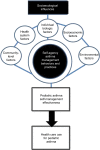A framework for measuring self-management effectiveness and health care use among pediatric asthma patients and families
- PMID: 28442924
- PMCID: PMC5396924
- DOI: 10.2147/JAA.S133481
A framework for measuring self-management effectiveness and health care use among pediatric asthma patients and families
Abstract
Asthma is associated with substantial health care expenditures, including an estimated US$56 billion per year in direct costs. A recurring theme in the asthma management literature is that costly asthma symptoms, including hospitalizations and multiple emergency department (ED)/outpatient visits, can often be prevented through patient/family adherence to the national (National Institutes of Health Expert Panel Report-3) guidelines for effective self-management of asthma, specifically 1) medication adherence and 2) environmental trigger avoidance, as outlined in the patient's personalized Asthma-Action Plan. It is important to note however that while effective self-management of asthma is known to reduce ED visits and hospitalizations, the relationship between asthma self-management effectiveness and outpatient visit frequency remains ambiguous, reflecting a gap in the literature. For instance, do patients/families who self-manage effectively visit outpatient clinics more frequently for asthma care (compared to those who do not self-manage effectively), after accounting for differences in asthma severity, demographic characteristics, and risk factors? Do patients/families who visit outpatient clinics more frequently for asthma care, in turn have fewer ED and inpatient encounters for asthma? On the other hand, do patients/families who do not revisit outpatient clinics regularly have higher ED visits and hospitalizations? It is important to address these gaps, in order to reduce the costs and public health burden of asthma. This paper provides a foundation for addressing these gaps, by conducting an integrative review of the asthma management literature, to develop a conceptual framework for measuring self-management effectiveness and health care use among pediatric asthma patients/families. In doing so, the paper lays the groundwork for future research seeking to explicate the relationship between asthma self-management effectiveness and health care use, which in turn has potential to engage asthma providers in promoting ideal self-management and optimal health care use for pediatric asthma, in accordance with national evidence-based guidelines for asthma management.
Keywords: evidence-based guidelines; health care use; patient-and-family-centered care; pediatric asthma; population health management; self-management.
Conflict of interest statement
Disclosure The author has no conflicts of interest to declare in this work.
Figures
Similar articles
-
Measurement of Key Constructs in a Holistic Framework for Assessing Self-Management Effectiveness of Pediatric Asthma.Int J Environ Res Public Health. 2019 Aug 23;16(17):3060. doi: 10.3390/ijerph16173060. Int J Environ Res Public Health. 2019. PMID: 31443605 Free PMC article. Review.
-
Short or Long End of the Lever? Associations between Provider Communication of the "Asthma-Action Plan" and Outpatient Revisits for Pediatric Asthma.J Hosp Adm. 2015 Oct;4(5):26-39. doi: 10.5430/jha.v4n5p26. Epub 2015 Jun 16. J Hosp Adm. 2015. PMID: 29201264 Free PMC article.
-
Association of an Asthma Improvement Collaborative With Health Care Utilization in Medicaid-Insured Pediatric Patients in an Urban Community.JAMA Pediatr. 2017 Nov 1;171(11):1072-1080. doi: 10.1001/jamapediatrics.2017.2600. JAMA Pediatr. 2017. PMID: 28975221 Free PMC article.
-
National surveillance for asthma--United States, 1980-2004.MMWR Surveill Summ. 2007 Oct 19;56(8):1-54. MMWR Surveill Summ. 2007. PMID: 17947969
-
A cost-effectiveness analysis of a peak flow-based asthma education and self-management plan in a high-cost population.J Asthma. 2004 Aug;41(5):559-65. J Asthma. 2004. PMID: 15360065 Review.
Cited by
-
Effect of Disease Severity, Age of Child, and Clinic No-Shows on Unscheduled Healthcare Use for Childhood Asthma at an Academic Medical Center.Int J Environ Res Public Health. 2023 Jan 13;20(2):1508. doi: 10.3390/ijerph20021508. Int J Environ Res Public Health. 2023. PMID: 36674266 Free PMC article.
-
Impact of adherence to treatment with inhaled corticosteroids/long-acting β-agonists on asthma outcomes in the United States.Ther Adv Respir Dis. 2022 Jan-Dec;16:17534666221116997. doi: 10.1177/17534666221116997. Ther Adv Respir Dis. 2022. PMID: 36036456 Free PMC article.
-
Measurement of Key Constructs in a Holistic Framework for Assessing Self-Management Effectiveness of Pediatric Asthma.Int J Environ Res Public Health. 2019 Aug 23;16(17):3060. doi: 10.3390/ijerph16173060. Int J Environ Res Public Health. 2019. PMID: 31443605 Free PMC article. Review.
-
Demographic and Risk-Factor Differences between Users and Non-Users of Unscheduled Healthcare among Pediatric Outpatients with Persistent Asthma.Int J Environ Res Public Health. 2020 Apr 15;17(8):2704. doi: 10.3390/ijerph17082704. Int J Environ Res Public Health. 2020. PMID: 32326397 Free PMC article.
-
Demographic and Risk Factor Differences between Children with "One-Time" and "Repeat" Visits to the Emergency Department for Asthma.Int J Environ Res Public Health. 2021 Jan 9;18(2):486. doi: 10.3390/ijerph18020486. Int J Environ Res Public Health. 2021. PMID: 33435304 Free PMC article.
References
-
- Akinbami LJ, Moorman JE, Bailey C, et al. Trends in asthma prevalence, health care use, and mortality in the United States, 2001–2010. Hyattsville, MD: National Center for Health Statistics; 2012. (NCHS data brief, no. 94). - PubMed
-
- US Centers for Disease Control and Prevention (CDC) Asthma self-management education and environmental management: approaches to enhancing reimbursement. 2013. [Accessed May 3, 2016]. Available from: http://www.cdc.gov/asthma/pdfs/Asthma_Reimbursement_Report.pdf.
-
- Bhogal S, Zemek R, Ducharme FM. Written action plans for asthma in children. Cochrane Database Syst Rev. 2006;3:CD005306. - PubMed
-
- Cloutier MM, Hall CB, Wakefield DB, Bailit H. Use of asthma guidelines by primary care providers to reduce hospitalization and emergency department visits in poor, minority, urban children. J Pediatr. 2005;146(5):591–597. - PubMed
Publication types
LinkOut - more resources
Full Text Sources
Other Literature Sources
Miscellaneous



